Review of Srikanth’s film
Due to his vision impairment, Srikanth Bolla is essentially limited to dreaming. He decides to dream big and to pursue those aspirations no matter what. His life mottos include “There is nothing I cannot do,” “I can’t run, so I must fight,” and “If others can, Sri also can.” He’s not requesting assistance.
He need direction and coaching. He wants no one to feel sorry for him because of his restrictions. He desires to be treated fairly. Together with authors Jagdeep Siddhu and Sumit Purohit, director Tushar Hiranandani skillfully combines all these elements into a straightforward yet powerful story in this biographical film about Srikanth.
“Main hero nahi ban raha, main hero hoon,” declares Rajkummar Rao, portraying Srikanth with perfect precision. That pretty much sums up his role in the movie. He is the centre of Srikanth’s universe and his idol, and he gives an impeccable performance from beginning to end.
The storyline
The narrative starts in July 1992 in Machilipatnam, Andhra Pradesh, when Srikanth (Rajkummar Rao) is born to Damodar Bolla (Srivinas Beesetty) and Venkatamma Bolla (Anusha Nuthula).
Though it only lasts a few minutes, the movie depicts Srikanth’s early years as a victim of bullying from other children who thought he was worthless and would eventually become a “blind beggar.” Soon after, Srikanth in Hyderabad for the blind. There, he meets Devika (Jyothika), a teacher who not only helps him with his academics but also teaches him how to walk independently.
Up until now, even though I love watching Rao on screen, I was unable to comprehend the age group he was portraying since it was obvious that the filmmakers weren’t too concerned with the finer points of his look. Rao appears a little too fake for a student in school. However, at this point in the movie.
Colleges follow the same regulations when it comes to higher education, though. In this case, Srikanth defies all expectations and, after being turned down by every Indian institution, receives an invitation from one of the top 4 universities in the world and accepts a full scholarship to MIT in Boston, Massachusetts.
The Defect in Our Reverse
which I thought veered off course a little too much and indulged in some character exaltation that had been mostly avoided until the intermission. The passages in which Srikanth is revealed to have become resentful, envious, and insecure against the very individuals who made it possible for him to thrive are masterfully written and immediately relatable.
Although Srikanth is not superman, he is capable of doing almost anything—and with a heroic twist—and Hiranandani has done a great job in portraying it by capturing some amazing moments. He succeeds academically as well as athleticall.
Another moment he leaves you completely speechless is when he gets to the airport and is refused boarding because, according to airline policy, a visually impaired person must have an accompanying person when they travel. The events that transpire and the way Sri resolves the matter not only make you grin, but they also serve as a subtly harsh reality check on the existing system, which does not treat PwDs fairly.
In addition to Rao’s faultless performance, Jyotika is equally proficient and gives a controlled performance. She not only allows Srikanth follow his own path, but also provides him the necessary grounding. Jyotika has some of the most charming and enjoyable moments with Rao, thanks to her charming on-screen persona and perfect emotional balancing.
Group Media Publications
Entertainment News Platforms – anyflix.in
Construction Infrastructure and Mining News Platform – https://cimreviews.com/
General News Platform – https://ihtlive.com/
Podcast Platforms – https://anyfm.in

